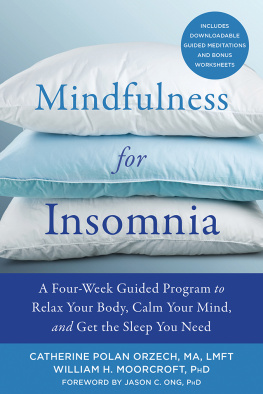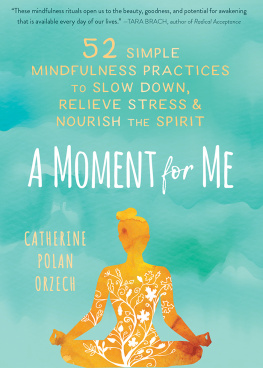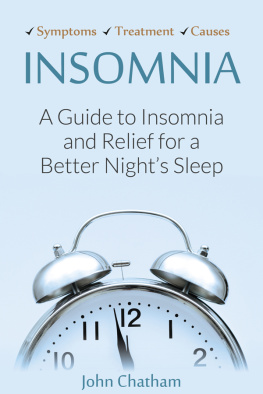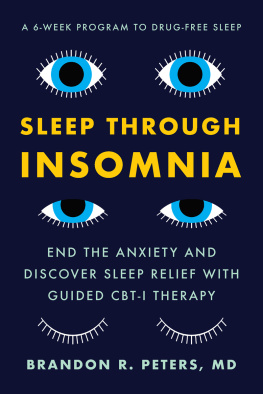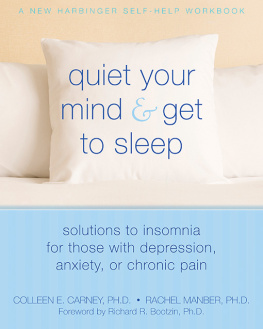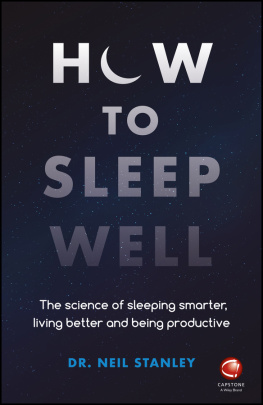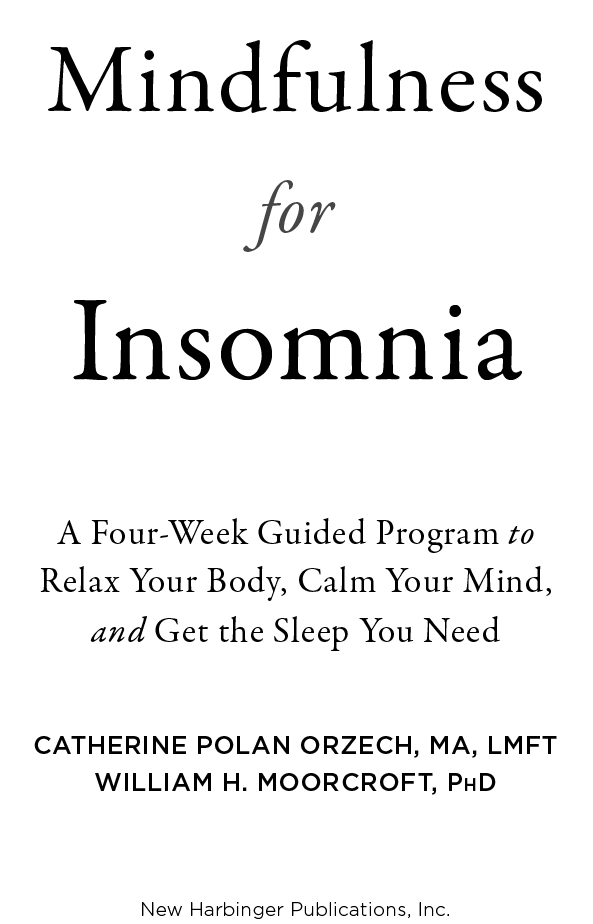Mindfulness for Insomnia is an in-depth guide to mindfulness and compassion training, as well as to the science of sleep. The book offers a dynamic combination of invaluable information and practical skills to support mind and body wellness. I highly recommend the four-week GMATI program skillfully detailed in this book for anyone who wants to reduce stress and improve sleep.
Diane Reibel, PhD , director of the Myrna Brind Center for Mindfulness at Thomas Jefferson University Hospitals, coauthor of Teaching Mindfulness , and coeditor of Resources for Teaching Mindfulness
As a busy person who struggles with insomnia, I found Mindfulness for Insomnia to be a practical and accessible guide toward better sleep. As a mindfulness practitioner for over fifteen years and a member of Thich Nhat Hanhs Plumb Village for a year, I consider its approach to mindfulness practice to be spot-on. And as a human in our complex and often chaotic world, this book helped me manage stress, find greater acceptance, and manage daily suffering from chronic illness with greater ease, and even joy. Mindfulness for Insomnia is packed with excellent meditation techniques. It is a practical and thorough guide, not only to sleeping better but also to living a healthier life. I highly recommend it.
Courtney Zenner Campbell , studied Buddhist philosophy intensively in college (in addition to practicing Buddhism since 2004), has taken a mindfulness-based stress reduction (MBSR) course, and was a resident at Thich Nhat Hanhs Plumb Village for a year
This book is a comprehensive guidebook and resource to get back to regular and restful sleep. Catherine Polan Orzech and Bill Moorcroft have pulled from a wide range of practices, disciplines, and subject matter, as well as a wealth of professional experience between them, to inform and teach useful life and sleep practices. The progression of guided exercises is straightforward and supported as if you are being personally coached along the way. Enjoy the richness of learning provided in this book and be well!
Deanna OConnell , is a mindfulness practitioner in Fort Collins, CO
Catherine Polan Orzech and William Moorcroft do an excellent job bringing what can be a complicated but extremely effective treatment for insomnia into an easy-to-read format. It is fortunate that now many people suffering from insomnia, who may not be able to access therapists trained in this technique, can now follow step-by-step instructions through this book. This guide consists of well-formulated, day-to-day instructions paired with online meditation recordings to provide a road map for those struggling with insomnia and desiring a behavioral approach that lasts long term.
Nicole Cirino, MD , reproductive psychiatrist, and associate professor and director of the Womens Mental Health and Wellness Program at the Center for Womens Health at Oregon Health & Science University
Mindfulness for Insomnia outlines a four-week program that provides people suffering from insomnia with a gentle method to work with their sleep-disrupting thoughts. Using a series of mindfulness practices and important information about how our minds can impact our sleep, the reader learns and uses daily mindfulness practice to move away from the insomnia struggle and in the direction of calm, restful sleep.
Jennifer L. Martin, PhD , is a clinical psychologist and academic researcher in Los Angeles, CA. She is associate professor of medicine at the University of California, Los Angeles
Thanks for an incredible treatment option for those suffering from insomnia! Although cognitive behavioral therapy for insomnia (CBT-I) is very effective, it does not work for everybody. Mindfulness for Insomnia offers an alternate approach to treatment which helps disarm the fears and anxiety so many with insomnia experience. I am grateful to have this book as a resource for my patients!
Ryan Wetzler, PsyD, DBSM, ABPP , founder of Sleep Health Center in Louisville, KY; and codeveloper of Night Owl - Sleep Coach, a CBT-I-based insomnia treatment app
If you find yourself trying harder and harder to overcome your insomnia, you may be discovering that it becomes more and more difficult to sleep. The dilemma of insomnia is beautifully articulated (and solved) in this informative, practical, and clear guide to bringing mindfulness to our challenges with sleep. Written in a light and inspiring style, this excellent book draws on the deep wisdom of mindfulness and compassion to support you in moving beyond insomnia. Let psychologists and mindfulness teachers, Catherine Polan Orzech and Bill Moorcroft, gently guide you to finding ease and sleep through the meditative practices of mindfulness and compassion, and maybe find some new ways to contend with stress of all sorts in your life.
Steven D. Hickman, PsyD , clinical psychologist and executive director at the Center for Mindful Self-Compassion, founding director of the UC San Diego Center for Mindfulness, and associate clinical professor at the UC San Diego School of Medicine
Publishers Note
This publication is designed to provide accurate and authoritative information in regard to the subject matter covered. It is sold with the understanding that the publisher is not engaged in rendering psychological, financial, legal, or other professional services. If expert assistance or counseling is needed, the services of a competent professional should be sought.
Distributed in Canada by Raincoast Books
Copyright 2019 by William M. Moorcroft and Catherine Polan Orzech
New Harbinger Publications, Inc.
5674 Shattuck Avenue
Oakland, CA 94609
www.newharbinger.com
The exercise Three-Minute Breathing Space is adapted from Mindfulness-Based Cognitive Therapy for Depression by Zindel V. Segal, J. Mark G. Williams, and John D. Teasdale. 2002 Guilford Press. Used by permission.
The exercises Affectionate Breathing, How Do You Treat a Friend, and Self-Compassion Break are adapted from the Mindful Self-Compassion Workbook by Kristin Neff and Christopher Germer. 2018 Guilford Press. Used by permission.
Rumi, excerpt from The Guesthouse, translated by Coleman Barks. Copyright 1997 by Coleman Barks. Used by permission.
Cover design by Amy Daniel; Text design by Michele Waters and Tracy Carlson; Acquired by Wendy Millstine;Edited by Ken Knabb;
All Rights Reserved
Printed in the United States of America
Library of Congress Cataloging-in-Publication Data on file
Contents
Acknowledgments
Catherine Polan Orzech:
To Wendy Millstine of New Harbinger, who eight years ago reached out to me and asked if Id write a book about mindfulness. I am grateful that she persisted. To Ryan Buresh and Caleb Beckwith, thank you for being patient and creative editors who helped shape how these teachings could best reach readers.
Without the hundreds of people who have attended the MBSR and MSC and other mindfulness classes Ive taught over the last twenty years, and the many clients who have come through my practice seeking a deeper healing connection to themselves, this book would not have been possible. What I have learned through sitting with all these people humbles me and inspires my belief in the healing power of a mind infused with mindful awareness and loving-kindness.
With the most humble and profound gratitude, I want to thank my teachers who have shared the wisdom of the dharma with me and embodied compassionate mindful awareness. To the many vipassana meditation teachers who have led retreats I have attended, to Jon Kabat-Zinn, who has tirelessly pioneered the dissemination of mindfulness, to Kristin Neff and Chris Germer, who developed the mindful self-compassion program and who persist in exploring and teaching compassion, I offer my endless gratitude. To Steve Hickman, the traveling bodhisattva: You inspire me by your endless ability to teach and share with more loving connected presence than seems humanly possible. And to Diane Reibel, my mentor and my friend: Without you and your guidance in meditation and in teaching, I would not be where I am today. I owe you more than I can possibly say. Thank you!

